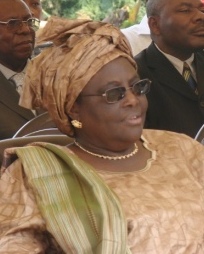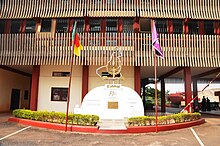Articles related to Cameroon include:

The International Relations Institute of Cameroon is one of the five Institutions of the University of Yaoundé II; it was created by decree of President Ahmadou Ahidjo on 24 April 1971. The organization of studies at the IRIC was renovated in 1993. Up until then, the Institute essentially focused on training diplomats. The new curriculum gives access to other international careers.

Parliamentary elections were held in Cameroon on 22 July 2007, with voting in some districts re-run on 30 September. Local elections were held on the same day, with seats on 363 town councils at stake. The result was a victory for the ruling Cameroon People's Democratic Movement (RDPC), which won 153 of the 180 seats in the National Assembly, whilst the main opposition party, the Social Democratic Front (SDF), won 16 seats.

The Divisions of Cameroon are the third-level units of administration in Cameroon. They are organised by divisions and sub divisions of each province.

The French National School for the Judiciary is a French grande école, founded in 1958 by French President Charles de Gaulle and the father of the current French Constitution, Michel Debré, in order to encourage law students to embrace a judicial career. Originally referred to as the National Centre for Judicial Studies, it was renamed the French National School for the Judiciary in 1972.

Cavayé Yéguié Djibril is a Cameroonian politician who has been the President of the National Assembly of Cameroon since 1992. He is a leading member of the Cameroon People's Democratic Movement (CPDM).
Louis-Paul Motazé is a Cameroonian politician who has served in the government of Cameroon as Minister of the Economy since 2015. He previously served as Minister of the Economy from 2007 to 2011 and as Secretary-General of the Office of the Prime Minister of Cameroon from 2011 to 2015. Since 2 March 2018, he has been Minister of Finance of Cameroon.
Jean-Bernard Ndongo Essomba was a Cameroonian politician. He was President of the Parliamentary Group of the Cameroon People's Democratic Movement (RDPC) in the National Assembly of Cameroon from 1992 to 1997 and he has held that post again since 2002.

Parliamentary elections were held in Cameroon on 30 September 2013, alongside local elections. They were originally scheduled for July 2012, February 2013 and July 2013, but were repeatedly postponed.
The following is a timeline of the history of the city of Yaoundé, Cameroon.
Victor Mukete was a traditional Chief in Cameroon. He was a minister of Information in Nigeria before the reunification of Southern Cameroons with former French Cameroon from 1958 to 1959. He was also a Senator.
Youssouf née Adidja Alim is a Cameroonian political figure. Since 2009, she has been the Minister of Basic Education.
Gabriel Dodo Ndoke was a Cameroonian tax auditor and politician of the Cameroon People's Democratic Movement. He served as Minister of Mines, Industries and Technological Development from 2019 to 2023.

Haman Adama, formerly known as Halimatou Mahonde from Garoua, was a Cameroonian politician who served as Minister of Education from 2004 to 2009.

Rolande Adèle Ngo Issi Kella Simgwa is a Cameroonian politician, serving as a member of the national assembly, an alternate member of the Superior Council of the Judiciary, and deputy secretary general of the Network of Women Parliamentarians of Cameroon. Additionally, she holds the position of secretary general of the regional delegation of the Cameroonian Party for National Reconciliation (PCRN) for the Center region.
Annie Noëlle Bahounoui Batende, is a Cameroonian magistrate. She was appointed on August 10, 2020, as president of the Special Criminal Court (TCS). She is the first woman to hold this position since its creation in 2012.
Justine Aimée Ngounou Tchokonthieu is a Cameroonian magistrate. Prosecutor General of the Special Criminal Court (TCS) in 2015 and she is the first woman to occupy this position since its creation in 2012.

Minette Libom Li Likeng, born on March 4, 1959, is a Cameroonian politician.

The Collège de la Retraite is a bilingual secondary school in Yaoundé, the capital of Cameroon. It is a Catholic institution managed by religious leaders.
The National School of Administration and Judiciary (ENAM), created on December 4, 1959, is a higher education institution for training administrative personnel in Burkina Faso, headquartered in Ouagadougou.








